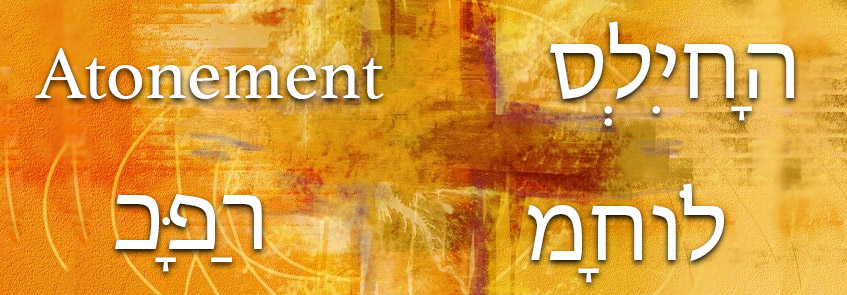
Atonement
Christianity usually defines Atonement as forgiveness. When I have forgiven or asked for forgiveness the problem has gone and that is it. But does the Hebrew behind the English word and the Jewish culture provide us deeper meaning to this word? Could we be missing out on the real power of Atonement and forgiveness all because we have over simplified the meaning?
There are 3 Hebrew words for forgiveness. Each one reveals an insight into how forgiveness works.
סְלִיחָה Selichah Strongs # 5547 translated as forgiveness, in Judism are prayers are said before Rosh Hashanah, also said throughout the year.
Selicha Same Hebrew letters as the Chasal = to finish. When someone hurts us the normal response is we want them to pay. But in doing so we allow the pain of the past to remain in the present. We are giving free real estate in our minds to whoever hurt us. Selichah is making a decision we are done with the pain that someone caused us. Chasal / finished. We are letting go of the past to focus on the future, to move on
The word selichah comes from the word salachu which means to sprinkle water. Water, of course, is a universal symbol of purity, and sprinkling is used in many purification rites. Selichah, then, acts as a kind of deodoriser, not removing sin, but making the reality of it easier to bear. Repentance removes sin, but we need cleansing. Dig deep into our heart to uproot the pain. How?
Mechila shares with the root word Machol מָחוֹל meaning rejoicing. We uproot the pain with rejoicing. Psalm 30:11 - "you have turned my pain into rejoicing"
We can’t do this until we realise God is in control and we turn over control of everything to him. Everything works out for good. Realise the presence of God wants to tunnel deep into our heart to bring healing.
If we are busy blaming everyone including God and everything else for my trouble and pain then we are carrying around the pain with us where ever we go. Who is king? The person or situation that hurt, stole from you or God?. If we continue to carry around the pain is dangerous. You know the same letters for Mechila also spell out?
Machala = sickness.
Machala we are poising ourselves by not moving on. The final step
Kopher meaning to restoration the relationship to the point closer than it was before. A return to a state of innocence, Leave here with a clean slate, a new start.
Kaparah also means "wiping up." If I spill my grape juice on your carpet, I can say sorry and be forgiven. But the stain is still there. Atonement only comes when I get the carpet cleaners to come clean your carpet.
The end result of Attonement (Kaparah) should result in no emotional, mental, physical effects from the sin you committed or that was committed against you.
Philippians 3:13 - Brothers, I do not consider that I have made it my own. But one thing I do: forgetting what lies behind and straining forward to what lies ahead, (ESV)
Hebrews 10:2 - Otherwise, would they not have ceased to be offered, since the worshipers, having once been cleansed, would no longer have any consciousness of sins? (ESV)
i.e Supernatural Forgetting, no emotional scars. If you're still thinking about what has happened to you or what you did then its not gone. If you're still reacting to similar situations its not gone. You need Yom Kippur
Hebrews 10:17–18 - “I will remember their sins and their lawless deeds no more.” Where there is forgiveness of these, there is no longer any offering for sin. (ESV)"
Hebrews 10:22 - "let us draw near with a true heart in full assurance of faith, with our hearts sprinkled clean from an evil conscience and our bodies washed with pure water." (ESV). The english "draw near" comes from the Hebrew Korban meaning to offer sacrifice i.e worship which according to this scripture sprinkle cleans our hearts and conscience and bodies.
